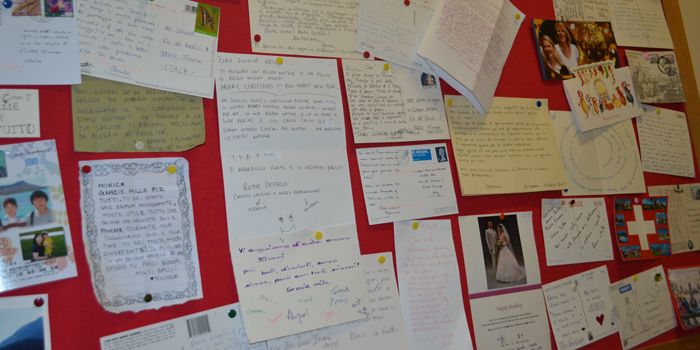General information on the courses

- At the ABC school it is possible to choose from an abundance of different courses of Italian which satisfy all needs.
- The group courses approach the Italian language from a general point of view however are complete regarding language and communication structures
- For those who have a particular interest or necessity to learn Italian, also for work purposes, we offer combined courses which include both group and individual lessons which can be focused on particular subjects (commercial or tourist Italian, sector-specific language, preparation for exams for certificates, translation from English to Italian).
- Language and culture courses focus on the Italian language as well as certain aspects of the culture which the student can choose (history of art, literature, history, fashion, design, food & wine)
- The 50+ program is for those who are more than 50 years old and would prefer to study the language at a pace better suited for adults. This includes the possibility of taking part in a special cultural activities program, with a teacher who will help them to understand and discover Florence, its history and traditions.
- As the Italian culture also involves a lot of good food, we have created some courses which combine Italian language lessons with this typically Italian aspect: Italian language and cooking will have no more secrets.
- For secondary school and college students who are travelling together with their teachers in Italy, it is possible to have Italian language lessons together as a group as well as activities which take place outside of the school and visits to museums and monuments.
- If you are planning a holiday to Italy and would like to learn the basics of the Italian language in order to be able to communicate with Italians, you may find our individual or group lessons on Italian holiday language useful.

Italian grammar lessons: what you learn
In the first half of the morning (from 9:00 am to 10:30 am) the lessons concentrate on linguistic structure.
The teachers give the students the grammatical knowledge they need through texts and practical examples which are based on our direct teaching method. You will also work on pronunciation, vocabulary, literature and writing of texts whilst carefully balancing all aspects of the language.
The grammar books used in class are written, edited and updated by the ABC school of Italian language and are given to the students on their arrival.
Italian conversation lessons: what you learn
For the second half of the morning (from 11:00 am to 12:30 pm) we focus on speaking: students are encouraged to actively use knowledge gained during the grammar classes. Teachers take accuracy into account as well as expressiveness and the student’s listening comprehension abilities by making use of a broad and diverse range of educational materials including reading and listening materials, authentic audio-visual materials and other educational activities created to practice specific language skills.

The levels
Students are placed into classes according to their abilities in the Italian language.
The level of the student is evaluated by a written grammar test which should be done online at least one week before arriving at school. There will also be a small oral conversation where we are able to understand your expressive and communicative capacities.
Students are able to complete one level of our program in an average of four weeks, however attending lessons does not guarantee that you will pass onto the next level. Teachers will communicate the abilities and difficulties of the individual students with the directors so that every student can be put in the correct class suited towards their learning abilities.
At the ABC school in Florence we normally have teachers for all levels (from A1 to C2 according to the CEFR, Common European Framework of Reference for Languages) even if the higher levels are less requested.
The CEFR divides learners of any foreign language based on their comprehension and interaction as follows:
Basic user
A1
Can understand and use familiar, everyday expressions and very basic phrases aimed at the satisfaction of needs of a concrete type. Can introduce themselves and others and can ask and answer questions about personal details such as where he/she lives, people they know and things they have. Can interact in a simple way, provided that the other person talks slowly and clearly and is prepared to help.
A2
Can understand sentences and frequently used expressions related to areas of most immediate relevance (e.g. very basic personal and family information, shopping, local geography, employment). Can communicate in simple and routine tasks requiring a simple and direct exchange of information on familiar and routine matters. Can describe in simple terms and aspects of their background, immediate environment and matters in areas of immediate need.
Independent user
B1
Can understand the main points of clear, standard input on familiar matters regularly encountered in work, school, leisure etc. Can deal with most situations likely to arise while travelling in an area where the language is spoken. Can produce simple, connected text on topics that are familiar or of personal interest. Can describe experiences and events, dreams, hopes and ambitions and briefly give reasons and explanations for opinions and plans.
B2
Can understand the main ideas of complex text on both concrete and abstract topics, including technical discussions in their field of specialisation. Can interact with a degree of fluency and spontaneity that makes regular interaction with native speakers quite possible without strain for either party. Can produce clear, detailed text on a wide range of subjects and explain a viewpoint on a topical issue giving the advantages and disadvantages of various options.
Proficient user
C1
Can understand a wide range of demanding, longer clauses and recognise implicit meaning. Can express ideas fluently and spontaneously without much obvious searching for expressions. Can use language flexibly and effectively for social, academic and professional purposes. Can produce clear, well-structured, detailed text on complex subjects, showing controlled use of organisational patterns, connectors and cohesive devices.
C2
Can understand with ease virtually everything heard or read. Can summarise information from different spoken and written sources, reconstructing arguments and accounts in a coherent presentation. Can express themselves spontaneously, very fluently and precisely, differentiating finer shades of meaning even in the most complex situations.
Source: Council of Europe Table 1 & Council of Europe Table 3






